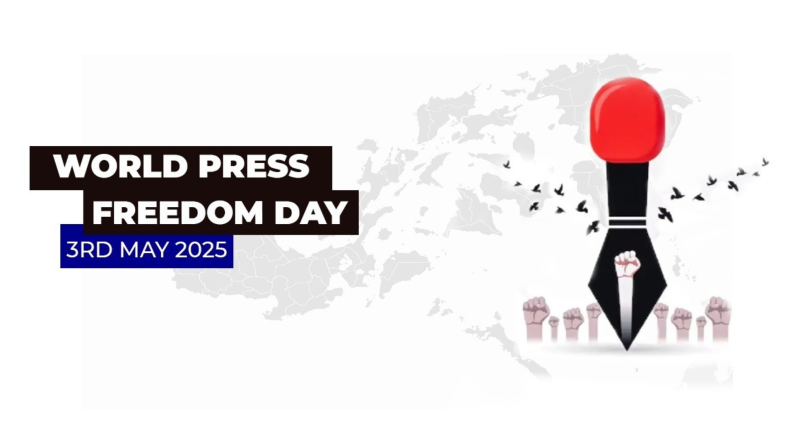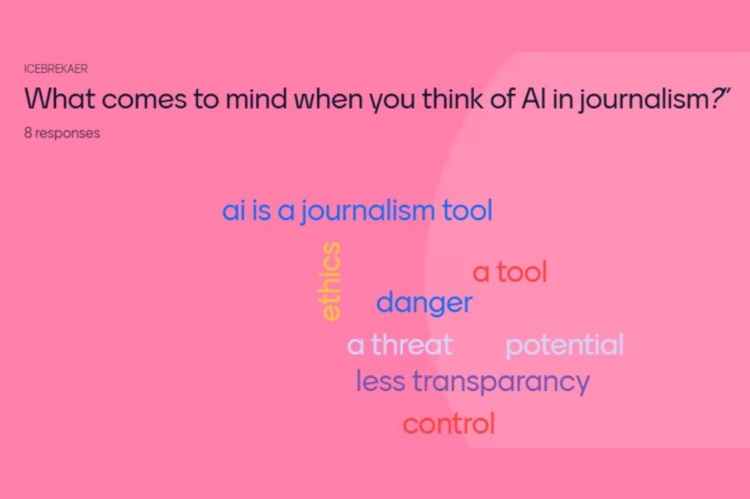
Many have paid the ultimate price; others have faced daily harassment, censorship and even imprisonment for simply doing their job. This day serves as a poignant reminder that a free press is not merely a democratic ideal, it is a lifeline for collective accountability that all of us should defend and uphold.
At Pro Peace,“Amplifying Stories of Peace: Bridging the Gaps Between Media and Civil Society for Peacebuilding” project is firmly anchored on this global commitment. By fostering collaborations between media practitioners and civil society actors, the project promotes a media landscape that is not only free but also reflective of alternative, diverse and inclusive narratives. We believe, as media and information landscapes evolve through beneficial technological advancements, so must our collective efforts in addressing the challenges and countering threats it brings along.
AI and the shifting media landscape
The advent of artificial intelligence (AI) is fundamentally reshaping how information is produced, curated, and consumed. From automated feature writing, real-time analytics to smart scheduling, AI tools have revolutionized newsroom operations, enabling faster content delivery and more targeted storytelling. For traditional and digital media alike, AI promises greater efficiency, personalization, and reach. Yet, the gains come with steep ethical and operational challenges. A central concern raised during the World Press Freedom Day Webinar was the growing dominance of algorithmic logic in media distribution. In today’s digital environment, unlike in the legacy media, visibility often depends less on editorial decisions and more on how well the content performs in an algorithmic ranking system. By means of this, it is a common for creators to prioritize the commercial imperative of the ranking system to curate content that would gather quick reactions across the board, drive traffic and boost likes, shares, subscription or followership regardless of whether the content undermines depth, nuance, diversity or truth telling. Algorithm in itself, does not have the capability in the sense of human judgement to decipher the importance of content outside these parameters. This leads to slow moving critical content and fast paced sensational content. Moreover, algorithms gradually enclose users within filter bubbles and echo chambers depending on their interaction with content in the information eco system, more often exposing them to information that aligns with their pre-existing mindset. This results in narrowing critical discourses, weakening of shared realities, logic and constructive critique. It would therefore take deliberate effort to promote more engagement and interactions with diverse and alternative narratives for the algorithm to also pick and popularize this.
Diversification of narratives draws a close nexus with both digitized AI driven and traditional platforms “Amplifying Stories of Peace: Bridging the Gaps Between Media and Civil Society for Peacebuilding” Project looks into this in the aspect of effective collaborations and synergies between journalists, civil society actors and digital content creators to be able to generate and disseminate compelling stories that reflect on diverse issues in line with peace building and conflict transformation. By facilitating dialogues, trainings, and collaborations, we build ecosystems where alternative, diverse and inclusive narratives can thrive, even in the face of technological challenges and commercial interests.
Like many emerging technologies AI presents a wide range of opportunities, benefits, systemic challenges and threats in a resounding measure and this is also largely informed by how we choose to use it and how it also works in itself as pointed above for example. During the webinar, participants emphasized on the need to understand AI as a tool, not a replacement for human journalism. In the sense of opportunities. For instance, when used efficiently, AI can go a long way in assisting with tasks such as summarizing press releases, tracking breaking news, translating content across different languages, speech to text or text to speech, voice recognition, fact checking and verification of information and many other ways. However, the quality of AI output is only as good as the data it is trained on and if those data sets are maliciously compromised to reflect biases, misinformation or systemic inequalities, AI can reinforce narratives which are not nuanced or sometimes misleading, or manipulative.
These risks are common. Disinformation campaigns now harness deepfakes, synthetic audio and chatbots contingents sew confusion and mistrust at an unprecedented scale. At the same time, AI is part of the remedy. In essence, it becomes the cause and the cure at the same time. For instance, AI enabled tools for debunking deepfakes, monitoring disinformation networks and flagging coordinated inauthentic behavior. Yet, technological solutions alone are not enough. It emerged during the webinar, that media ethics should continue being integral part of journalism, ensuring that journalists remain grounded on accuracy, fairness accountable through their work.
One resounding call from the World Press Freedom Day Webinar was for a renewed commitment to Media and Information Literacy (MIL). As AI-powered platforms increasingly shape what people see, believe, and act upon, the ability to critically assess media content was deemed more vital than ever. This is especially important in contexts like the Philippines, where MIL has reportedly been phased out from school curricula, a move that risks creating a generation of citizens ill-equipped to navigate complex digital landscapes, vulnerable to information disorders. The panel argued that MIL must be integrated across subjects and disciplines, not treated as an extracurricular option. Further, educators to be empowered to teach AI literacy, critical thinking, and ethical technology use. Additionally, young content creators be trained not only in digital production but also in verifying information, understanding algorithmic influence, and engaging with diverse perspectives.
Realities in the global south
During the panel discussion, it emerged that media and civil society actors in the Global South face both digital and financial exclusion. In the absence of inclusive AI governance, these disparities become even more entrenched. Surveillance technology, data exploitation and content suppression become present serious challenges. In this regard collective effort is crucial in order to advocate for locally grounded AI policies that are responsive to the shared realities and challenges face in the global south. Through consultations and strategic dialogue, we promote structures that enhance, and do not replace, ethical pluralistic journalism with AI.
One more thing that stood out also was the move to create Media-Citizens Council- Community based body that holds media accountable, mediate disputes and promote transparency. We envision approaches where civil society can engage with media not just as consumers but as co-creators of content that is nuanced, inclusive and diverse. These are helpful collaborations to address gatekeeping of dominant narratives and allow grassroot voices to shape public discourse. The convergence of World Press Freedom Day and our new initiative emphasizes a common perception: that press freedom cannot be separated from narrative diversity. Both are essential to counter disinformation, resist authoritarianism, and nurture a peace-conscious public sphere. As AI continues to redefine media, our challenge is clear, not just to adapt, but to actively shape the technologies, ethics, and narratives that will define this era. 2025 World Press Freedom Day serves as a collective commitment to high quality and constructive journalism discourses. Let us amplify not just the noise, but the narratives that matter.
